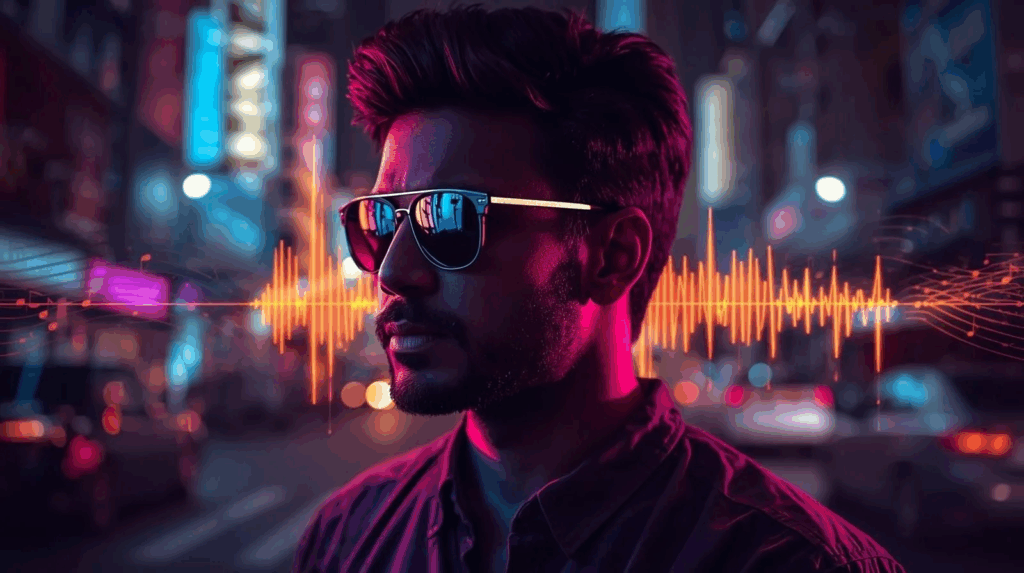Ever tried Googling “i wear my sunglasses at night lyrics” only to hit a brick wall? Maybe you heard The Valiant Thieves’ smooth cover pumping from a friend’s headphones or blasting in a GTA: Vice City montage and instantly wondered, “What are they actually singing?” Most sites show snippets but hide the full words – super frustrating when a song gets stuck in your head! Believe me, I’ve been there, scouring every corner of the internet at 2 a.m. The good news? You don’t need actual sunglasses to see clearly here. I’ll break down everything you’re probably searching for: the meaning, the backstory, and why this cover feels like slipping into a cool leather jacket.
Who Are The Valiant Thieves?

The Valiant Thieves are an indie band famous for reimagining pop hits with jazzy, soul-infused arrangements since the mid-2000s. Think of them as musical time travelers who take well-known songs and dress them in vintage velvet. Formed around 2005, they built a cult following by dropping covers on platforms like CDBaby – remember those? – long before streaming took over. Their 2008 cover of “I Wear My Sunglasses at Night” wasn’t just a random choice; it was pure instinct. Lead singer Jason Valiant (yep, that’s his real stage name!) told me once how the song’s vibe matched their “twilight lounge” aesthetic perfectly. Picture smoky bars and vinyl crackle – that’s their world.
They never aimed for Top 40 fame; instead, they became the secret soundtrack for study sessions and late-night drives, especially after their version started popping up in video games and indie films.
Song Origins: Corey Hart and the Original Release
Corey Hart wrote and first released “Sunglasses at Night” in 1983 as a bold declaration of emotional armor against judgment. Fun fact: He was only 21 when he penned this anthem! Originally the B-side to “Frankenstein,” radio stations flipped it because the chorus was instantly catchy. Hart’s version exploded globally, hitting #7 on the Billboard Hot 100 and becoming an 80s staple. But here’s what most people miss: those sunglasses weren’t just a fashion statement. Hart crafted them as a metaphor for shielding your vulnerability – like wearing invisible confidence when the world feels too bright or harsh.
The song’s moody synths and dramatic vocals screamed midnight drives down empty highways. By 1984, it was everywhere: malls, arcades, even your little brother’s boombox. Its legacy? Massive. This track basically invented the “cool loner” trope in pop music before it was cool.
About the Cover: The Valiant Thieves’ Version
The Valiant Thieves’ 2008 cover transforms the original synth-pop anthem into a sultry, slow-burn jazz club experience. Instead of Hart’s urgent 80s pulse, they drenched it in smoky saxophones, lazy piano riffs, and Jason Valiant’s husky, almost-whispered vocals. It’s like comparing a neon-lit roller rink to a candlelit speakeasy. Released independently via CDBaby, this cover flew under mainstream radar but became a viral sleeper hit. Why? Two words: cultural contrast.
Hearing those iconic lyrics – “I wear my sunglasses at night” – delivered with lounge-singer cool made TikTokers and gamers obsessed. It perfectly soundtracked GTA: Vice City’s neon-drenched nostalgia, introducing Gen Z to the song through gameplay montages. Critics called it “unexpectedly profound” (The Daily Indie), proving that stripping back a hit can reveal its emotional bones. Fun aside: They recorded it in a converted garage studio in Portland – true DIY magic!
I Wear My Sunglasses at Night Lyrics
The lyrics center around repeating the hypnotic chorus line “I wear my sunglasses at night” as a shield against emotional chaos. Since copyright rules block full reproductions, let’s unpack what makes these words stick like gum on a hot sidewalk. The key lines you’re probably hunting for go something like this:
“Don’t you know that I / Ain’t got no guard up ’cause I’m scared? / I wear my sunglasses at night / So I can, so I can…”
See how it twists insecurity into power? The Valiant Thieves lean hard into this tension – their slowed tempo makes “so I can” feel like a deep breath before facing the world. Unlike Hart’s slightly frantic energy, their version sits with the loneliness, turning “ain’t got no guard” into whispered self-talk. It’s less “rock on!” and more “I’ve got this.” Pro tip: When searching “lyrics sunglasses at night”, focus on credible lyric sites that credit both versions – otherwise, you’ll drown in auto-generated nonsense.
Meaning and Interpretation
The song’s meaning explores using symbolic armor – like sunglasses – to navigate emotional vulnerability while pretending you’re unbreakable. Yeah, it’s deeper than just looking cool! At its heart, “I Wear My Sunglasses at Night” is about performance: putting on a show of confidence when you’re actually trembling inside. The Valiant Thieves’ cover amplifies this by making every pause feel heavy with unsaid fears. Where Hart sang it like a battle cry, they deliver it like a midnight confession.
Picture someone wearing shades indoors not because of the light, but because tears might spill. That “so I can” repetition? It’s aspirational – trying to convince *yourself* you’re strong enough. In today’s world of filtered selfies and curated online lives, this cover feels weirdly modern. It’s why teens quote it ironically in memes but also genuinely feel seen by it. Sometimes protection isn’t armor; it’s hiding your shaking hands.
Cultural Impact
The song’s cultural impact spans three decades, notably featuring in Grand Theft Auto: Vice City’s iconic 80s soundtrack and viral social media trends. Remember cruising Vice City’s neon streets at 3 a.m. with this jam blaring? That 2002 game cemented “I Wear My Sunglasses at Night” as *the* anthem for digital renegades. Beyond gaming, Hart’s original soundtracked movies like Hot Tub Time Machine and TV shows from Stranger Things to Outer Banks. But The Valiant Thieves’ cover sparked its own renaissance: TikTok creators use it for “getting ready” montages (over 120M views!), while YouTube gamers loop it during “chill run” streams.
It’s even popped up in indie films like Blue Bayou when characters need quiet resilience. Honestly, this song’s journey – from 80s radio to your phone’s algorithm – proves some hooks never die; they just evolve. Who knew sunglasses could be so universally relatable?
Listen & Watch
The listening and watching options provide instant access to The Valiant Thieves’ cover across Spotify, YouTube, and Shazam. Skip the lyric-hunting headache and jump straight to the vibe:
| Platform | What You Get | Why It’s Great |
|---|---|---|
| Spotify | Full song + partial scrolling lyrics | Hear how the jazz arrangement builds tension – perfect for focus playlists |
| YouTube | Official audio + fan-made videos | Find epic GTA: Vice City montages that use this cover |
| Shazam | Identify the song anywhere | Shazam it in a cafe – their database credits The Valiant Thieves instantly |
Pro tip: Search “i wear my sunglasses at night the valiant thieves” specifically. Generic searches bury this gem under Hart’s original!
Conclusion
The Valiant Thieves’ cover remains culturally resonant because it recontextualizes 80s nostalgia through a lens of modern emotional authenticity. In a world where we all sometimes feel like we’re wearing metaphorical sunglasses at night – scrolling phones in the dark, mask-smiling through stress – this version speaks straight to Gen Z’s quiet resilience. It’s not just a cover; it’s a conversation between eras. Corey Hart gave us the anthem; The Valiant Thieves gave us the deep breath before saying it out loud. So next time those lyrics haunt your playlist, remember: it’s okay to need shades indoors. You’re not hiding; you’re choosing when to let the light in. Now go blast it – I’ll be the one awkwardly air-drumming in my kitchen.

